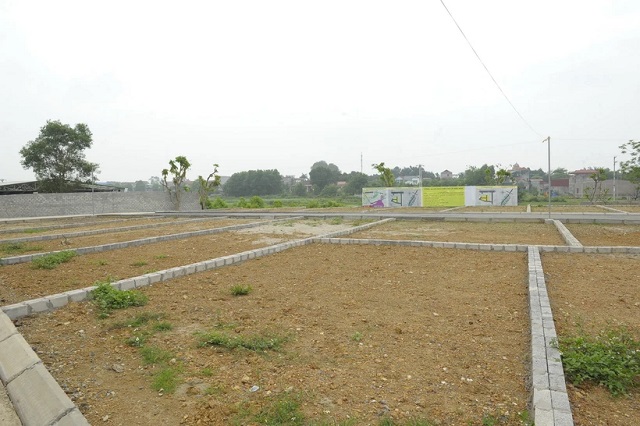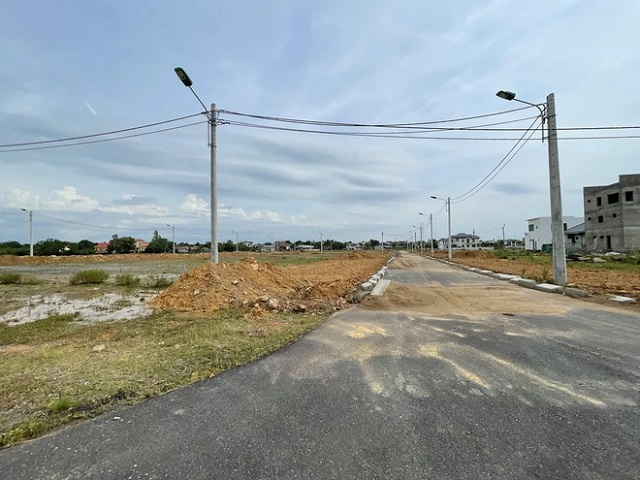
A subdivided plot of land. (Illustrative image: Manh Khanh/TTXVN)
|
One of the new provisions of the amended Land Law that was just passed is the regulation on the option to choose the form of land lease payment, which brings innovation.
Economic organizations that are granted land leases by the state for a lump-sum payment for the entire lease period can choose to switch to annual land lease payments.
As a result, businesses can flexibly choose the form of land lease payment and expect to reduce the difficulty of paying a large amount of money immediately while needing to distribute their financial resources more reasonably. Furthermore, when financial pressure decreases, investors can balance capital costs and lower house prices. However, not all businesses are excited about this new regulation.
According to Article 2, Clause 30 of the latest Land Law, the payment of land lease fees that have already been made will be deducted from the annual land lease fees to be paid according to government regulations. Economic organizations that are granted land leases for a lump-sum payment can switch to annual land lease payments.
This provision is applicable to economic organizations, individuals, Vietnamese expatriates, and foreign-invested economic organizations that lease land from the state for the entire lease period and can choose to switch to annual lease payments.
Previously, the 2013 Land Law stipulated that businesses and individuals were allowed to switch from annual land lease payments to lump-sum payments for the entire lease period. However, the reverse conversion from a lump-sum to annual payments was not mentioned.
According to experts, this new provision supports businesses and adjusts revenue sources to stimulate land benefits. Paying annual land fees will help investors reduce financial burdens during the initial stages of project implementation. Therefore, real estate prices have the opportunity to be adjusted to a more reasonable level, leading to better quality finished products…
The Vietnam Real Estate Brokers Association (VARS) commented that this new provision provides the state with an opportunity to increase revenue based on the added value of land over time, rather than just receiving a lump sum. However, VARS recommends that specific regulations be set forth regarding the time frames for adjusting land use fees, as well as reasonable calculation methods and limits.
This is to prevent businesses from being anxious and having to establish large contingency funds because if land fees are adjusted annually and increase over time, additional costs will arise. In that case, not only will the goal of reducing financial pressure not be achieved, but it will also create a sense of anxiety and uncertainty for businesses, according to VARS.
Although the flexibility of the new provisions in the new Land Law is acknowledged, businesses are not enthusiastic about them.
Mr. Nguyen Anh Que – Chairman of G6 Group – commented that this provision creates convenience for businesses that face difficulties and are unable to make a lump-sum payment to choose annual payments instead.
However, if a business has already made a payment, it will not receive a refund from the state. Instead, the payment will be deducted from the lease period. As a result, there are two possible scenarios. If a business has partially paid the land rent, it is fine. But if a business has paid in full, there is no need to switch back. Therefore, this provision only benefits businesses that have not paid the land rent or have only paid a portion, analyzed Mr. Que.
Moreover, fewer businesses will be enthusiastic about this new provision in the amended Land Law, as if they choose annual payments, the overall payment will be higher because the annual rates will gradually increase. This does not include the disadvantages in bidding for investors if annual payments are made.
Therefore, until now, the situation has been one-sided, with businesses requesting to switch from annual to lump-sum payments rather than the other way around. This is especially true because upon making a lump-sum payment, the land plot is granted a certificate and can be mortgaged with banks.
Pham Duc Toan, CEO of EZ Property Investment and Development Joint Stock Company (EZ Property), believes that this provision goes against the perspective of businesses because currently, most businesses request and prefer lump-sum payments.
In Toan’s analysis, the value of a plot of land is completely different when paying in a lump sum compared to paying annually. When a business pays in a lump sum, that is recorded as a fixed asset which is eligible for bank mortgages. However, when a business pays annually, it is for leased land, and only assets on the land can be mortgaged. Not to mention that annual land fees change and tend to increase, which creates financial risks.
 Illustrative image. (Source: TTXVN)
|
Toan also believes that this provision is only suitable for cases where land leases are paid once and not yet paid, so businesses can choose to pay annually to solve short-term difficulties.
From an expert’s perspective, Dr. Dinh Trong Thinh believes that collecting annual land fees will cause many concerns for businesses. If annual land rent fees increase significantly, it could disrupt a business’s financial plans.
In addition, many businesses will worry about the limited rights of land leaseholders who pay annual fees compared to those who make lump-sum payments.
According to Dr. Thinh, every issue has two sides, and it is important to carefully consider which side has more benefits and limits potential issues. From there, reasonable legal policies can be established to ensure sustainable and stable economic development.
Thu Hang












